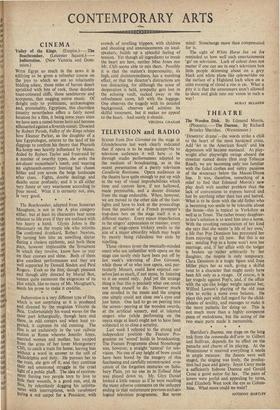CONTEMPORARY ARTS
CINEMA •
Valley of the Kings. (Empire.)—The Beachcomber. (Leicester Square.)— Indiscretion. (New Victoria and Dom- inion.) Wax Egypt so much in the news it is edifying to be given a refresher course on the joys to which we are so reluctantly bidding adieu; those miles of barren desert sprinkled with bits of rock, those desolate toast-coloured cliffs, those sandstorms and scorpions, that nagging native music. Of delight only to politicians, archaeologists and, presumably, Egyptians, this charmless Country nevertheless offers a fairly novel location for a film, it being some years since we have seen a camel-borne hero and heroine silhouetted against a feverish sunset. Directed by Robert Pirosh, Valley of the Kings relates how Eleanor Parker, as the daughter of a lgte Egyptologist, returns to the land of his diggings to confirm his theory that Pharaoh Ra-hotep was heavily influenced by Moses. Aided by Robert Taylor and frustrated by a number of swarthy types, she seeks the Soi-disant monotheist's tomb, and wearing an eighteenth-century hunting hat chases hither and yon across the beige landscape after clues. Fights, double dealings and deaths occur profusely; and it is all either Very funny or very wearisome according to
frour mood. What it is certainly not, alas, s very good.
The Beachcomber, adapted from Somerset Maugham, is not in the A plus category either, but at least its characters bear some relation to life even if they are outlined with too heavy a hand. Glynis Johns is the missionary on the tropic isle who reforms the confirmed drunkard, Robert Newton, by turning him into an unwilling doctor during a cholera epidemic, and both these Stars, however implausible the 'firmament In which they revolve, know how to stay On their courses and shine. Both of them give excellent performances and they are well supported by Donald Sinden and Paul Rogers.- Even so the film, though pleasant and though ably directed by Muriel Box, Cannot quite surmount the exigencies of its Plot which, like so many of Mr. Maugham's,
needs his prose to make it credible. • Indiscretion is a very different type of film, which is not surprising as it is produced and directed by the magician Vittorio de Sica. Unfortunately his wand waves for the Most part lethargically, though here and there, in odd comers and when least ex- pected, it captures its old cunning. The film is set exclusively in the vast railway station at Rome whereto Jennifer Jones, Married woman and mother, has escaped from the arms of her lover Montgomery Clift, to catch a train for home, leaving him Without a word in answer to the' call of Philadelphia and duty. He pursues her to the train, she gets off it, and they continue their sad emotional struggle in the cruel light of a public plact. The idea of environ- ment forcing two people torn by love to hide their wounds, is a good one, and de by relentlessly dogging his unfortu- nates with interruptions, with carabinierl laying a red carpet for a President, with
• • •
crowds of revelling trippers, with children and shouting and announcements on loud- speakers, builds up a splendid feeling of tension. Yet though all ingredients to break the heart are here, neither Miss Jones nor Mr. Cliff seems able to mix them. Possibly it is that the station's impersonality, its high, cold disinterestedness, has a numbing effect, or that the director's distractions are too distracting, for although the sense of desperation is held, sympathy gets lost in the echoing vault, sucked away in the refreshment room, left with the luggage. One observes the tragedy with its detailed background, observes and admires its skilful treatment, but it makes no appeal to the heart. And surely it should.
VIRGINIA GRAHAM


































 Previous page
Previous page